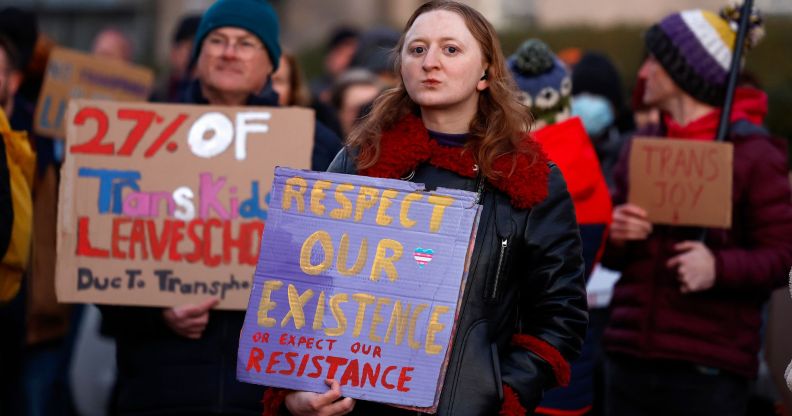Trans groups slam dad’s lawsuit against autistic adult daughter seeking gender-affirming surgery

The open letter was signed by hundreds of activists, figureheads and supporters. (Getty)
An open letter signed by 42 charities and hundreds of individuals has strongly condemned legal action against an autistic trans adult’s decision to get gender-affirming surgery.
Advocacy group Trans Safety Network published a letter on Wednesday (14 June) opposing a case brought by an anonymous father attempting to blockade his 21-year-old trans daughter from undergoing the procedure consensually.
The father, who wished to remain anonymous in an interview with the Daily Mail, said he believed his daughter, whom he repeatedly misgendered, must wait until she is 25 to receive the surgery.
“[She] may chronologically be an age but, maturity-wise, that’s not the case,” the father told the Daily Mail. “At the moment [she’s] 21, but [she’s] probably acting like [she’s] 16 or 17.”
The open letter vehemently condemns both the father’s legal complaint and solicitor Paul Conrathe for taking up the case, saying it opposes the attempts to “undermine” the bodily autonomy and medical choices of an autistic person.
Conrathe, who reportedly has a history of taking on reactionary legal cases, is reportedly seeking a judicial review into what he calls “limited protection” for autistic young adults.
The open letter responded: “The proposed judicial review runs contrary to the most basic principles of disabled people’s rights in healthcare.
“If the proposed judicial review goes ahead, it could seriously undermine the principle of disabled adults being assumed to have capacity to make decisions about their care until proven otherwise,” it continued.
“It could also limit disabled trans and gender-diverse people’s access to transition care.”
Charities and advocacy groups who signed the letter include the LGBT Foundation, TransActual, the LGBTIQA+ Greens, and many more.
Trans Safety Network researcher Mallory Moore told PinkNews that the group noticed the “growing exploitation” of negative steretypes around neurodiverse and disabled trans people.
“Some anti-trans activists and clinicians have been stereotyping trans people collectively as autistic, meaning that this narrative affects many trans people who aren’t autistic,” Moore continued.
“Many of our volunteers are disabled or neurodiverent. We can’t separate the attacks we face as trans people from the attacks we face as disabled people and feel strongly that we are safer together.
“We have observed a narrative of infantilising trans and disabled adults which draw both on stereotypes of trans people being mentally ill and on disabled people being in need of other people to control their lives.”
One of the organisations to sign the letter, the Greater Manchester Coalition of Disabled People (GMCDP), said the open letter was “in line with our usual policies and is a matter that concerns our members”.
A spokesperson for the group said to PinkNews that its committee signed the open letter “quickly and unanimously”, adding: “GMCDP is committed to supporting people to fight discrimination, and paternalism,” they continued. “It is inherently wrong to discriminate against people because they are disabled, or trans, or both.
“GMCDP have many members who are on the autistic spectrum, including on our executive council – some of our members also happen to be transgender.
“We are not going to be silent while bigots use autism and/or learning difficulties or mental health as an excuse to undermine laws concerning freedom of choice about medical treatments. It’s crucial that all disabled people have equal choices around their health that can’t be taken away, including by their parents.”
‘Bodily autonomy is a basic human right’
The group pointed to principles laid out in the Mental Capacity Act 2005 as examples of why it condemned the case.
Principle one of the Act states that every adult must be assumed capable to make consensual decisions unless explicitly proved otherwise, meaning that medical conditions or disability alone are not enough to justify denying access to healthcare.
Principle two, which Trans Safety Network also cited, states that a person must be provided with “all practicable help” before being denied access to healthcare, meaning that autonomy should be encouraged before healthcare access is shut off.
It also noted Conrathe’s involvement in the now-overturned Bell v Tavistock judgement, which sought to “limit young trans people’s access to treatment.”
It added that the judgement was in “direct opposition” to the Gillick competency, which allows young people to consensually access contraception without informing parents.
“Beyond the legal issues, we believe that bodily autonomy is a basic human right which nobody should be denied on the basis of disability or gender,” the statement continued
“Autistic adults have a fundamental right to make decisions about their own healthcare, regardless of opinions or prejudices of their parents.“
PinkNews has contacted the Trans Safety Network and Paul Conrathe for comment.

